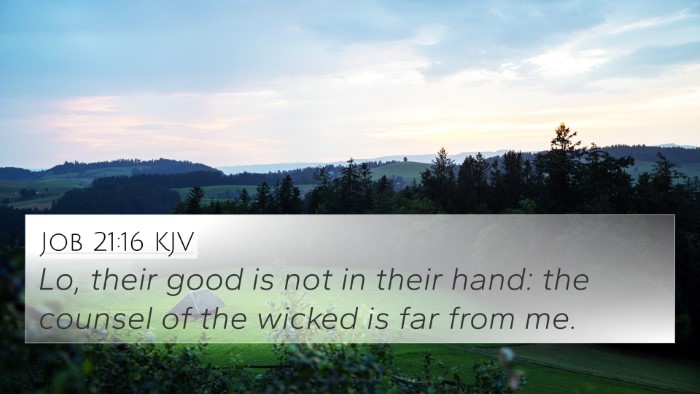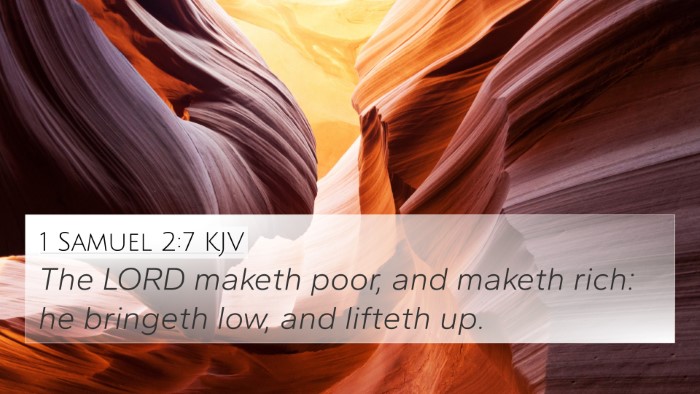Old Testament
Genesis Exodus Leviticus Numbers Deuteronomy Joshua Judges Ruth 1 Samuel 2 Samuel 1 Kings 2 Kings 1 Chronicles 2 Chronicles Ezra Nehemiah Esther Job Psalms Proverbs Ecclesiastes Song of Solomon Isaiah Jeremiah Lamentations Ezekiel Daniel Hosea Joel Amos Obadiah Jonah Micah Nahum Habakkuk Zephaniah Haggai Zechariah MalachiJob 22:18 Similar Verses
Job 22:18 Cross References
Yet he filled their houses with good things: but the counsel of the wicked is far from me.
Uncover the Rich Themes and Topics of This Bible Verse
Listed below are the Bible themes associated with Job 22:18. We invite you to explore each theme to gain deeper insights into the Scriptures.
Job 22:18 Cross Reference Verses
This section features a detailed cross-reference designed to enrich your understanding of the Scriptures. Below, you will find carefully selected verses that echo the themes and teachings related to Job 22:18 KJV. Click on any image to explore detailed analyses of related Bible verses and uncover deeper theological insights.
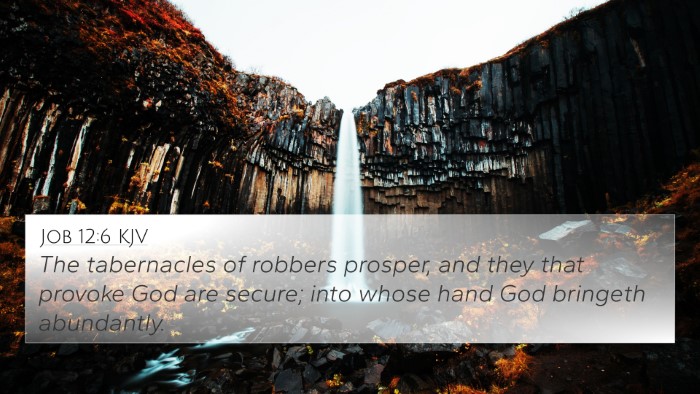
Job 12:6 (KJV) »
The tabernacles of robbers prosper, and they that provoke God are secure; into whose hand God bringeth abundantly.
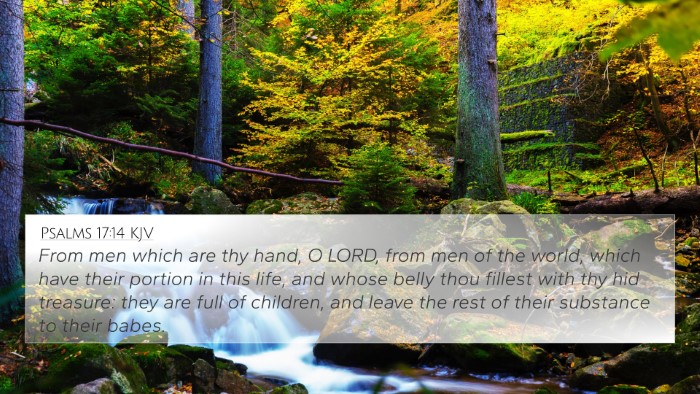
Psalms 17:14 (KJV) »
From men which are thy hand, O LORD, from men of the world, which have their portion in this life, and whose belly thou fillest with thy hid treasure: they are full of children, and leave the rest of their substance to their babes.

Psalms 1:1 (KJV) »
Blessed is the man that walketh not in the counsel of the ungodly, nor standeth in the way of sinners, nor sitteth in the seat of the scornful.
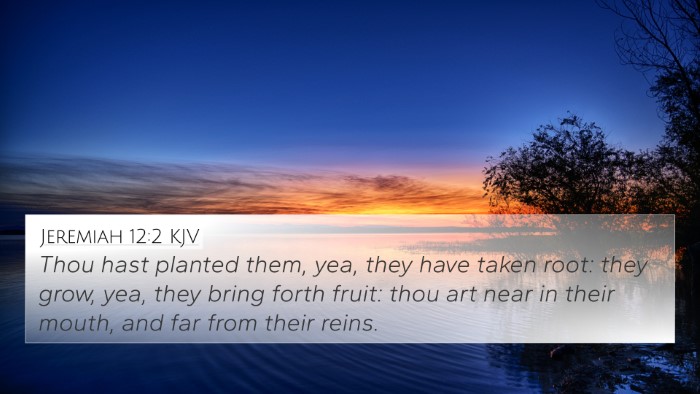
Jeremiah 12:2 (KJV) »
Thou hast planted them, yea, they have taken root: they grow, yea, they bring forth fruit: thou art near in their mouth, and far from their reins.
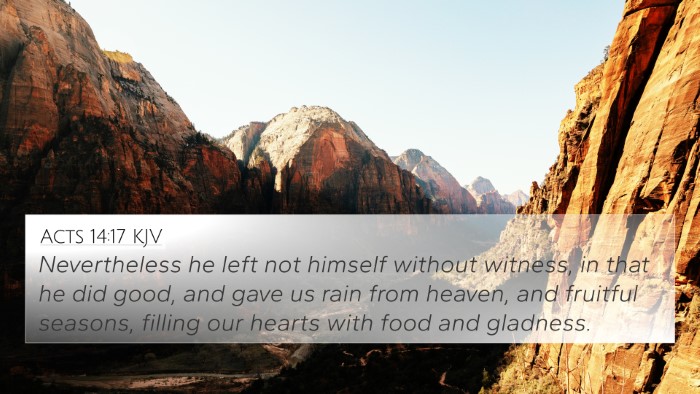
Acts 14:17 (KJV) »
Nevertheless he left not himself without witness, in that he did good, and gave us rain from heaven, and fruitful seasons, filling our hearts with food and gladness.

Acts 15:16 (KJV) »
After this I will return, and will build again the tabernacle of David, which is fallen down; and I will build again the ruins thereof, and I will set it up:
Job 22:18 Verse Analysis and Similar Verses
Understanding Job 22:18
Bible Verse: Job 22:18 - "But he said, ‘It’s not true; he will not bring this upon you.’”
This verse, nestled in the discourse between Job and his friends, presents a pivotal moment in understanding the deeper themes present in the Book of Job, as well as a broader conversation about divine justice and human suffering.
Overview of the Verse
In Job 22:18, the context revolves around Eliphaz the Temanite’s argument. Eliphaz contends that God does not act against the righteous and that Job’s suffering implies some hidden sin. This statement reflects a theme prevalent in the era: the belief that suffering is a direct consequence of sin.
Commentary Insights
Matthew Henry's Commentary
Matthew Henry highlights the assertion made by Eliphaz—a gross misunderstanding of the relationship between suffering and righteousness. Henry clarifies that the claim made by Eliphaz presents God’s attributes inaccurately, suggesting that divine favor is strictly conditional upon human goodness. Job’s trials, therefore, must be rooted in failing to meet certain moral expectations, which fails to acknowledge God’s sovereignty and the mystery of His divine plan.
Albert Barnes' Notes
Albert Barnes elaborates on the implications of Eliphaz’s statements, emphasizing the misconstrued theology of retribution that he presents. Barnes infers that this theology reduces God to a mechanical deity who merely rewards or punishes based on human actions. Job’s insistence on his innocence challenges this limited perception and introduces the idea that suffering may occur independently of sinfulness, highlighting the nuances in the biblical portrayal of human experience and divine interaction.
Adam Clarke's Commentary
Adam Clarke provides an additional layer of analysis by illustrating how Eliphaz attempts to absolve God of any responsibility in the suffering witnessed by Job. Clarke posits that this line of thinking is not only superficial but dangerous, as it can lead individuals to question God's goodness in the face of adversity. The commentary probes deeper into the nature of God's justice, suggesting that human comprehension of such matters is inherently limited.
Thematic Connections
The core theme in Job 22:18 connects to several significant biblical themes, such as divine justice, the problem of suffering, and the nature of God. Here are some Bible verse cross-references to enhance understanding:
- Job 1:22 - Job did not sin nor charge God with wrong, demonstrating his integrity.
- Job 4:7 - “Consider now: Who, being innocent, has ever perished?” indicating the common belief in retribution.
- Psalms 73:2-3 - The psalmist’s struggle with the prosperity of the wicked presents a similar tension.
- Proverbs 3:12 - “For whom the Lord loves He corrects,” reinforcing the theme of divine discipline.
- John 9:3 - Jesus clarifies that not all suffering is a result of sin, aligning with Job’s assertions.
- Romans 3:23 - All have sinned, suggesting that suffering affects everyone, not just the wicked.
- Hebrews 12:6-7 - The notion that God disciplines those He loves links back to the themes found in Job’s discourse.
Links with Other Biblical Texts
The connections between Bible verses enrich our understanding of Job 22:18. This verse can be contextualized within the broader narrative of the scriptures, revealing inter-Biblical dialogue:
- Isaiah 40:31 - Encouragement in times of waiting reflects the essence of trust in God’s plan amidst suffering.
- 2 Corinthians 4:17 - The light of momentary afflictions works a far greater eternal weight of glory.
- Revelation 21:4 - The promise of God wiping away every tear connects hope with suffering.
Application for Study
This verse invites deeper examination of the assumption that suffering equates to divine punishment and promotes a critical reflection on the nature of God's justice. Using tools for Bible cross-referencing, readers can explore how various verses relate and contribute to a greater theological understanding.
How to use Bible cross-references:
- Utilize a Bible concordance or a cross-reference Bible study guide to identify related scriptures.
- Explore comparative Bible verse analysis to reveal thematic relationships and insights.
- Engage in inter-Biblical dialogue by linking themes and messages between passages.
Reflection and Conclusion
Job 22:18 serves as a reminder that human understanding is often insufficient to grasp the divine workings of justice and suffering. It challenges readers to look beyond surface-level interpretations and appreciate the complexities of faith and divine sovereignty. By examining cross-referenced texts and their interconnections, individuals can deepen their understanding of scripture and its application in their lives.



